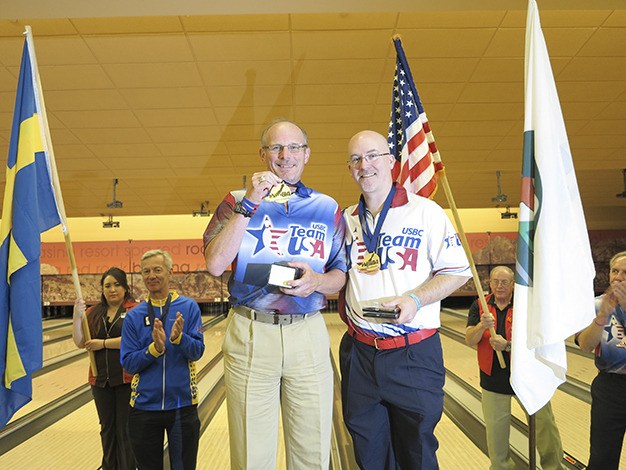Islander and professional bowler, Hugh Miller, and his teammate, Ron Mohr, of Team USA, captured the men’s doubles title at the inaugural World Senior Bowling Championships held at Red Rock Lanes in Las Vegas on Aug. 24.
In the men’s championship match, Miller/Mohr came out commandingly and cruised to a 450-387 victory over Colombia’s Edgar Gomez and David Romero.
The eventual champions led the 60 men’s and 43 women’s doubles after six games of qualifying on the 40-feet Athens lane en route to earn the No. 1 seed for the one-game playoffs.
Miller, whose resume includes seven PBA Tour titles and three PBA Senior Tour wins, 32 PBA Regional and four PBA50 Regional titles, started with a four-bagger (four strikes in a row), and Mohr, an eight-time winner on the PBA Senior Tour and two-time PBA over 50 Player of the Year (2009, 2011), had a spare and three consecutive strikes to take a 60-pin lead, and never looked back.
Miller finished with 223 and Mohr added 227 to win the second gold medal of the championships for the host country, and the first for the men’s team.
“The competition here [at the World Senior Championships] is completely different to bowling on the PBA Tour,” Mohr said. “To bowl for your country is something special. This title certainly ranks up with a PBA title.”
His teammate, Miller, agreed. “It is like playing for the Davis Cup in tennis or the Ryder Cup [in golf], Miller said. “It is playing for your country.”
Miller, a 1975 graduate of Mercer Island High School, has lived on the Island since he was a boy. His bowling career, however, began at an alley in the Queen Anne Hill neighborhood of Seattle where he lived with his parents until they moved to the Island. It was his mother who started him on his career on the lanes.
“My mom bowled like many women back then,” he explained. ”She used to take me with her.”
After moving across the lake, he began bowling in earnest at Belle Lanes in Bellevue and, of course, the long defunct Mercer Island Lanes on the Island.
He figures he long ago met what author Malcolm Gladwell coined as the “10,000-Hour Rule.” Gladwell and others have said that the key to success in any field is, to a large extent, a matter of practicing a specific task for 10,000 hours.
The Island bowler figures that he achieved that threshold by the time he was in his early 20s. From the time he was 13, Miller figures he probably bowled three hours per day at least three times each week.
“It is the time you put in,” he said simply. “That is how you get good.”
And it has worked.
Terry Bigham, of the United States Bowling Congress, said that Miller has averaged right at 220 during his seven years on the senior tour.
Miller remembers all the bowling alleys in Seattle and beyond. He laments the loss of the places he played and knew well.
Yet, while bowling began to lose its appeal in the 1990s, renewed interest in the sport is now coming from outside the United States.
“The growth in the sport now is international,” Miller said. “The next world tournament may be in Vienna.”
Much of the growth is in northern European countries such as Finland and Sweden; and Malaysia and Korea, where women are embracing the sport, he explained.
The pro said that he is semi-retired. He accompanies his son to bowling events now. He still does tournaments, but says it is more for enjoyment rather than the prize money.
According to PBA figures, he has won nearly $900,000 since he began competing professionally in 1980.
He has done a few competitions internationally in Japan and Finland, and said he has played in nearly every state in the U.S. except a few in New England. When he does go, he often says he does not spend a lot of time getting ready ahead of time.
“I might use the qualifying round to warm up,” he said.
Miller also works as a real estate agent for Windermere, and still lives in the house where he grew up near the high school that his sons attend. He intends to stay.
Bowling is never far away from anyone’s mind in the Miller household, said Miller’s wife, Donna.
“Our dining room table is part of a lane from Leilani Lanes in Seattle that was torn down a few years ago,” she explained.
“It is a big table,” she laughs.



